UB commemorates Black History Month
The University of Botswana English Department in partnership with the American Embassy joined the rest of the world in commemorating the 13th Annual Black History Month at the University Library Auditorium on February 20-22, 2018.

The event was to remember and honour African-Americans and celebrate their contributions towards the United State of America. During the month, different entities across the world including universities and organisations held events to impart knowledge on the rich culture and about notable figures who are an important part of the African-American history.
Consequently, this year’s commemoration included the Black History Month Film Festival organised under the theme: “African Americans in Terms of War,” showcasing documentary films on the role of African-Americans during American wars, from revolutionary wars to the present, and the war against terrorism.
Officiating at the start of the three-day event on February 20, 2018, US Ambassador, Mr Earl Miller, said Black History Month was an integral part of America’s traditions during which they continued to promote positive examples of poignant historical events, exemplary leaders and steps towards societal change.
Mr Miller also pointed out that showcasing documentaries on Black History would help the world to remember that history and create awareness on the struggles and challenges of African-Americans in the past. He said their struggles were an indication of perseverance, and further served as inspiration to diverse communities. Mr Miller quoted extensively from former USA President, Mr Barack Obama’s speech on the 50th anniversary of the March on Washington on August 28, 2013, at the Lincoln Memorial to support this year’s the theme.
“Many had gone to segregated schools and sat at segregated lunch counters, had lived in towns where they couldn't vote, in cities where their votes didn't matter. There were couples in love who couldn't marry, soldiers who fought for freedom abroad they found denied to them at home. They had seen loved ones beaten and children fire-hosed. And they had every reason to lash out in anger or resign themselves to a bitter fate.
And yet they chose a different path. In the face of hatred, they prayed for their tormentors. In the face of violence, they stood up and sat in with the moral force of non-violence. Willingly, they went to jail to protest unjust laws, their cells swelling with the sound of freedom songs. A lifetime of indignities had taught them no man can take away the dignity and grace God grants us. They had learned through hard experience what Frederick Douglas once taught: freedom is not given; it must be won through struggle and discipline, persistence and faith,” said Mr Miller.
University of Botswana Dean of the Faculty Humanities, Professor Anderson Chebanne, said films on Black History helped the University as part of innovative teaching because they complimented literature texts studied in the American and African American literature courses.
“Given current challenges with textbooks, films could be one way around such challenges with their visual impression which concretize the literary texts in the student’s minds,” said Professor Chebanne.
He further said with superb ICT infrastructure, UB had to teach innovatively, and films on Black History could be exploited to enhance research profiles given that some of their students were potential graduate students. He also appreciated the US Ambassador for the embassy’s continued support for the past 13 years by providing teaching to their students and improving their experience.